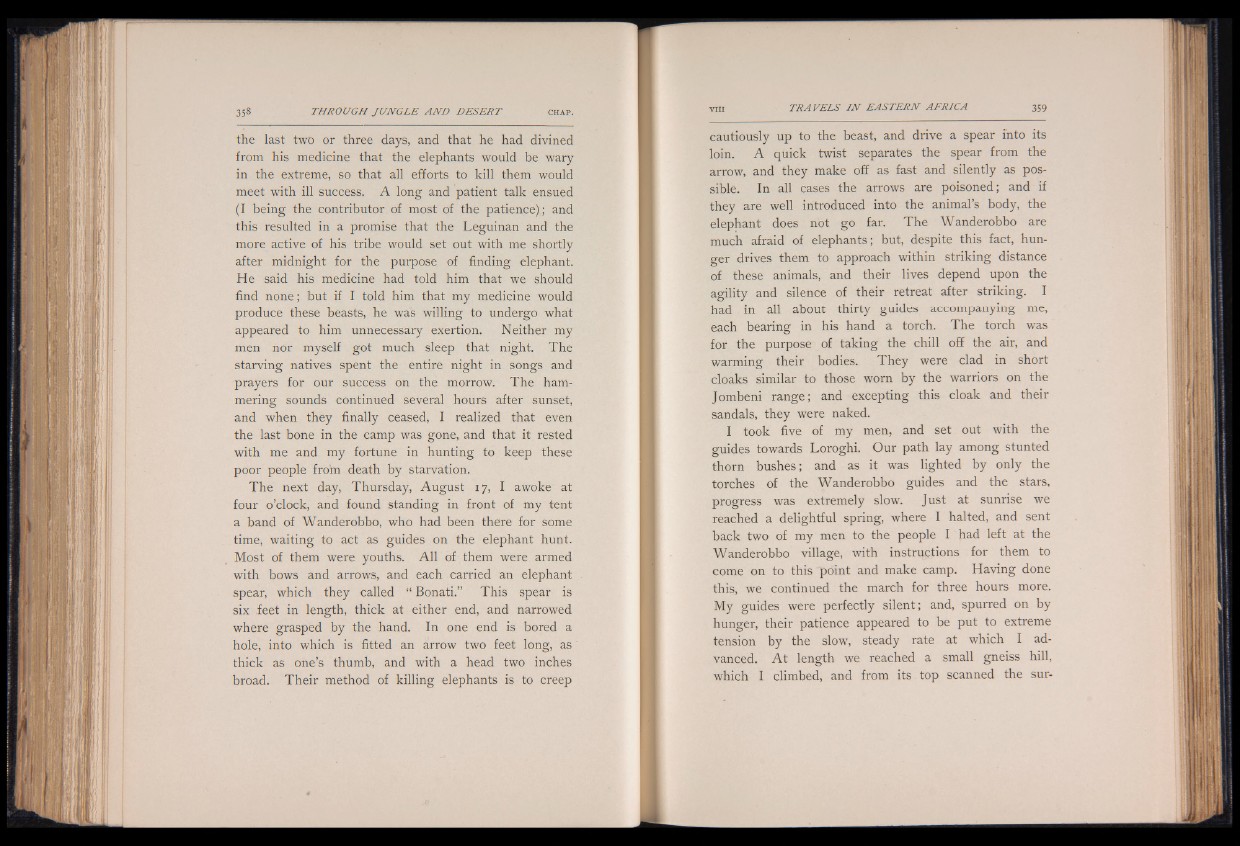
the last two or three days, and that he had divined
from his medicine that the elephants would be wary
in the extreme, so that all efforts to kill them would
meet with ill success. A long and patient talk ensued
(I being the contributor of most of the patience); and
this resulted in a promise that the Leguinan and the
more active of his tribe would set out with me shortly
after midnight for the purpose of finding elephant.
He said his medicine had told him that we should
find none; but if I told him that my medicine would
produce these beasts, he was willing to undergo what
appeared to him unnecessary exertion. Neither my
men nor myself got much sleep that night. The
starving natives spent the entire night in songs and
prayers for our success on the morrow. The hammering
sounds continued several hours after sunset,
and when they finally ceased, I realized that even
the last bone in the camp was gone, and that it rested
with me and my fortune in hunting to keep these
poor people from death by starvation.
The next day, Thursday, August 17, I awoke at
four o’clock, and found standing in front of my tent
a band of Wanderobbo, who had been there for some
time, waiting to act as guides on the elephant hunt.
Most of them were youths. All of them were armed
with bows and arrows, and each carried an elephant
spear, which they called “ Bonati.” This spear is
six feet in length, thick at either end, and narrowed
where grasped by the hand. In one end is bored a
hole, into which is fitted an arrow two feet long, as
thick as one’s thumb, and with a head two inches
broad. Their method of killing elephants is to creep
cautiously up to the beast, and drive a spear into its
loin. A quick twist separates the spear from the
arrow, and they make off as fast and silently as possible.
In all cases the arrows are poisoned; and if
they are well introduced into the animal’s body, the
elephant does not go far. The Wanderobbo are
much afraid of elephants; but, despite this fact, hunger
drives them to approach within striking distance
of these animals, and their lives depend upon the
agility and silence of their retreat after striking. I
had in all about thirty guides accompanying me,
each bearing in his hand a torch. The torch was
for the purpose of taking the chill off the air, and
warming their bodies. They were clad in short
cloaks similar to those worn by the warriors on the
J ombeni range; and excepting this cloak and their
sandals, they were naked.
I took five of my men, and set out with the
guides towards Loroghi. Our path lay among stunted
thorn bushes; and as it was lighted by only the
torches of the Wanderobbo guides and the stars,
progress was extremely slow. Just at sunrise we
reached a delightful spring, where I halted, and sent
back two of my men to the people I had left at the
Wanderobbo village, with instructions for them to
come on to this point and make camp. Having done
this, we continued the march for three hours more.
My guides were perfectly silent; and, spurred on by
hunger, their patience appeared to be put to extreme
tension by the slow, steady rate at which I advanced.
A t length we reached a small gneiss hill,
which I climbed, and from its top scanned the sur